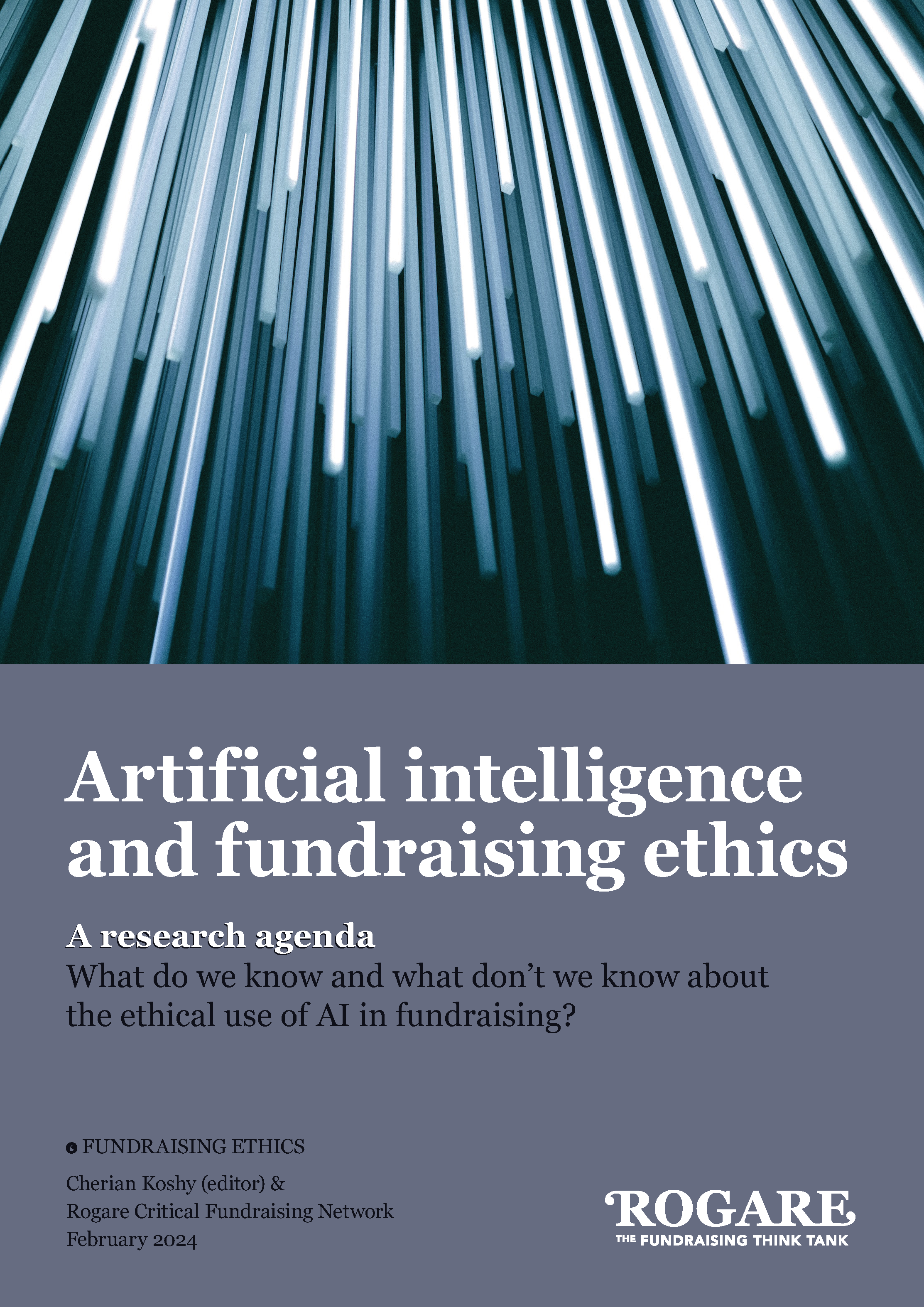- Home
- About Us
- The Team / Contact Us
- Books and Resources
- Privacy Policy
- Nonprofit Employer of Choice Award

 In the report “Artificial Intelligence and Fundraising Ethics,” Rogare’s project team identified potential ethical issues relating to the use of AI in fundraising in seven areas: data and data ethics, equity, transparency, accountability, identity disclosure, public trust, second-order effects. Rather than describe generic ethical issues regarding AI (all use of AI in all sectors raises issues of data ethics and human oversight) they tried to relate them to the specifics of using AI in fundraising.
In the report “Artificial Intelligence and Fundraising Ethics,” Rogare’s project team identified potential ethical issues relating to the use of AI in fundraising in seven areas: data and data ethics, equity, transparency, accountability, identity disclosure, public trust, second-order effects. Rather than describe generic ethical issues regarding AI (all use of AI in all sectors raises issues of data ethics and human oversight) they tried to relate them to the specifics of using AI in fundraising.
In this excerpt, the impact of AI on equity is considered.
Equity
Access – Costs of AI could concentrate capabilities among large, well-funded nonprofits, excluding smaller organisations from AI benefits. Yet equal access enables AI to help overcome barriers such as language differences between donors and beneficiaries. Policies must balance open access with necessary funding of AI development.
Widening gaps – The funding gap between large and small nonprofits could grow as bigger budgets allow quicker AI adoption. But shared data infrastructure and open standards could mitigate this.
Manipulation – AI could enable more effective emotional manipulation, disproportionately targeting disadvantaged or vulnerable populations. Safeguards against exploitative communication must be robust.
Exclusion – AI risks sidelining communities from telling their own stories if used for automated personalised messaging. The dignity of beneficiaries could be violated by not enabling direct participation. Oversight is critical.
Encoded biases – Historical biases around race, gender, income and other attributes in fundraising data could lead AI to reinforce discrimination and widen inclusion gaps. Detecting and correcting these biases is not a one-time task but an ongoing process that requires diverse oversight and continual refinement.
While acknowledging these challenges, it’s also important to highlight the potential of AI to foster equity and inclusivity in fundraising.
AI, implemented properly, could empower smaller charities, enabling them to produce more effective fundraising content swiftly and cost-effectively, thereby levelling the playing field. Moreover, AI tools offer opportunities for under-represented groups in fundraising, such as those not traditionally university-educated, to enhance their skills and contribute valuable perspectives.
This approach is not about compensating for perceived deficiencies; rather, it’s about leveraging technology to amplify diverse voices and enable all fundraisers to reach their full potential. AI should be seen as a tool to bridge gaps, not to plaster over them. It is vital to avoid over-generalisations or assumptions about groups based on education or background. By harnessing AI responsibly and ethically, we can make fundraising more inclusive, representing a wider range of experiences and backgrounds.
Training and educational initiatives should accompany the deployment of any AI tools, providing fundraisers with the knowledge and skills to use these technologies and involve lived experiences effectively. This holistic approach ensures that AI is not only a technological solution but also a part of a broader strategy to enhance the fundraising profession for everyone, irrespective of their educational or socio- economic background.
This paper, “Artificial Intelligence and Fundraising Ethics,” along with all of Rogare’s reports, research and other outputs, is available free of charge to the fundraising profession. Rogare thinks it is important that people should be able to access all the ideas coming out of Rogare, and are able to provide this access through the ongoing generous support of—Ask Direct (Ireland), Bluefrog Fundraising (UK), ST (Stephen Thomas Ltd) (Canada), GoalBusters (USA) and Giving Architects (NZ). Details of all their projects can be found on the Rogare website – www.rogare.net